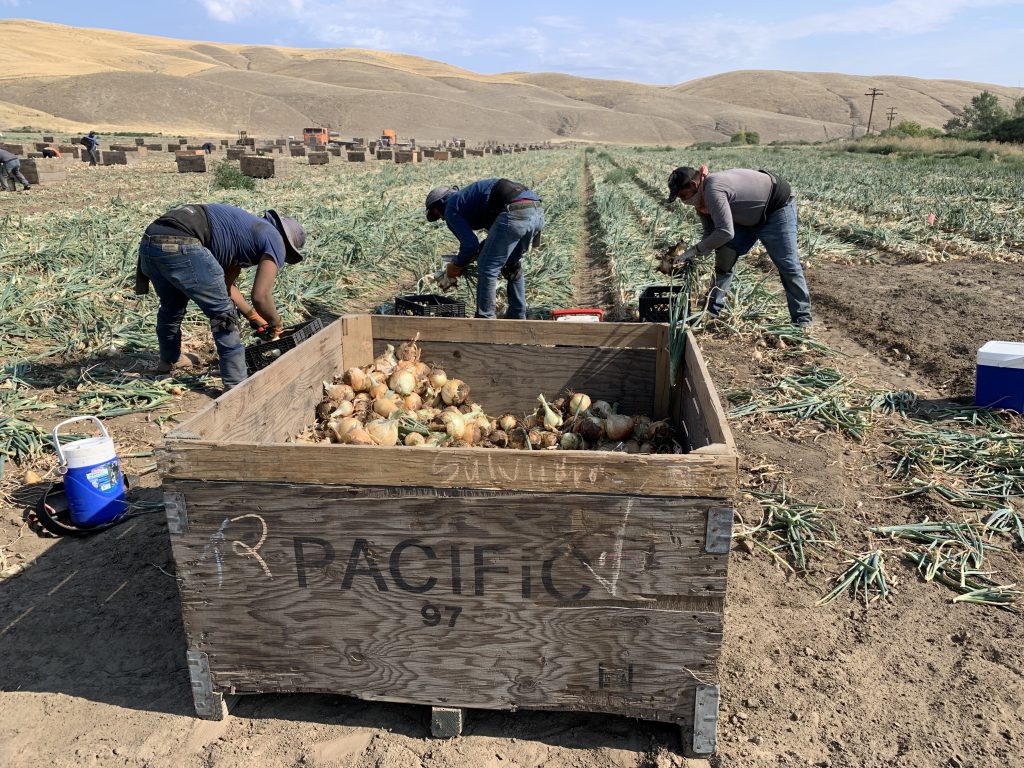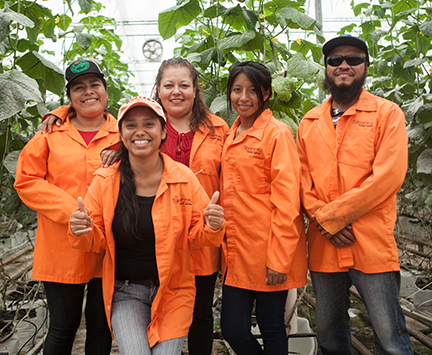When Perspectives and Goals of Farmworkers, Growers, Retailers and Consumers Align, Conditions Improve
 Today’s fresh produce industry leaders are quick to acknowledge that their employees are their most valuable assets and that providing farmworkers with fair wages and working conditions that reflect the importance and professionalism of their work is the right thing and the smart thing to do. However, respecting farmworkers as talented and skilled professionals is historically new.
Today’s fresh produce industry leaders are quick to acknowledge that their employees are their most valuable assets and that providing farmworkers with fair wages and working conditions that reflect the importance and professionalism of their work is the right thing and the smart thing to do. However, respecting farmworkers as talented and skilled professionals is historically new.
Digging into the history of farming in America over the past 400 years reveals overlapping layers of groups who have toiled under an imbalance of power: indentured servants, trafficked and enslaved Africans, imported immigrants from Asia and Latin America, Mexican braceros, the Dust Bowl poor who lost their own farms during the Depression and even many of today’s invited guest workers.
Over the generations, farmworkers and farm owners have often been on opposing sides with unaligned perspectives, and consumers and retailers have been uninvolved or disconnected from the experience of the workers who are behind the fresh food on American tables. Each one of these groups (farmworkers, growers, consumers and retailers) holds some power in directing the norms and expectations surrounding working conditions for farmworkers. In moments when interests and energies align, conditions improve.
Consider the following examples from recent history:
- Laws passed in the 1930s meant to improve working conditions and provide protections like guaranteed overtime pay and the prohibition of child labor excluded agricultural workers. Some credit the Thanksgiving week release of the 1960 documentary Harvest of Shame for tipping the scales of public support to pass legislation in Congress that included funding for health services and education for migrant workers and their children.
- In the late 1960s and early 1970s, when striking farmworkers left the fields and headed to the cities to urge grocery shoppers to boycott the crops involved in strikes led by Cesar Chavez, Dolores Huerta and the United Farm Workers, the consumer voice added powerful leverage to the farmworker movement, ultimately resulting in new contracts for unionized farmworkers on the West Coast.
- In 2014 the L.A. Times series “Product of Mexico” brought attention to unethical labor practices such as slave-like working conditions and child labor in the international supply chain of many major U.S. retailers. American consumers were outraged and pushed retailers to review their purchasing practices and rid their supply chains of abuse and exploitation.
- As an indirect result of the momentum associated with the “Product of Mexico” series, the Produce Marketing Association and the United Fresh Produce Association (now the International Fresh Produce Association) began meeting to establish the Ethical Charter on Responsible Labor Practices in 2017 and adopted it in 2018. As of January 2022, 375 growers, labor agencies, packers, distributors, foodservice operators, marketers and retailers have endorsed the Ethical Charter, which assures ethical working standards and humane treatment for farmworkers in the fresh produce and floral industries.
 These moments in the history of the farmworker movement show that success is created through a confluence of voices. Equitable Food Initiative (EFI) wants to see more convergence moments happen, when the perspectives and goals of growers, farmworkers, retailers and consumers align and collaboratively move toward a food system that’s more equitable for everyone. Now is a time ripe for action.
These moments in the history of the farmworker movement show that success is created through a confluence of voices. Equitable Food Initiative (EFI) wants to see more convergence moments happen, when the perspectives and goals of growers, farmworkers, retailers and consumers align and collaboratively move toward a food system that’s more equitable for everyone. Now is a time ripe for action.
A new leaf is turning in the story of the farmworker in American agriculture. With the pandemic came a new wave of consumer awareness surrounding the realities of the food supply chain and experiences and rights of the men and women working as farmworkers – the backbone of this economy. Retailers large and small are listening to consumer demand and making moves in favor of greater transparency in the food supply chain.
Both the people in the industry who keep the fresh produce aisles full and the people who shop there are beginning to understand that the demands of a hungry nation are met through the talent and sacrifice of a skilled, professional workforce of farmworkers who deserve respect.
Growers’ commitments to responsible labor practices are the boots on the ground of the movement to recognize the skilled labor of farmworkers. The sustainability of that value shines through the benefits of an engaged workforce, including improved organizational culture, better product quality and higher efficiency, as seen by EFI-certified farmworkers and growers. EFI’s multi-stakeholder approach to certification covering labor practices, food safety and pest management creates a structural way for voices that were once disconnected or in opposition to work together for the benefit of all.
Find out more about how EFI is transforming agriculture and improving the lives of farmworkers.
Read more about responsible recruitment.
Hear what EFI-certified growers and farmworkers have to say about their experience with EFI:
- “There’s been a history of farmworkers and laborers being taken advantage of, and by, farms that would cut corners. With organizations like EFI, there’s assurance that the employee’s not going to be exploited and they’re going to be fairly compensated for the time that they contribute.” – Chris Jorgensen, EFI Leadership Team member and Human Resources for Hartley Produce/Onions52
- “Since becoming part of the EFI committee I have witnessed employees change their demeanor in how they work. They are happier, have a safer working environment, they know that their voice is being acknowledge and heard at the table.” – Miguel Campos, Grower, Houweling’s Group, LT Member
- “In the agricultural community, we all have the intention of providing a good environment for our workforce out in the field and in our processing facilities. The challenge is that we come to work with all different backgrounds, cultures and languages. EFI has helped us bridge those differences and build a collaborative effort where our intention is the reality out in the farms and in our facilities throughout our organization.” – West Mathison, President, Stemilt
- “I feel protected and good, I am a leader thanks to EFI, and work on continuous improvements thanks to EFI. The field is open to everyone. The field is the past and the future, and with EFI we will keep improving working conditions.” – Tammy Garcia, quality control at GoodFarms LT Member
- “EFI is the only certification that brings value to our farm. The other certifications are valuable in the marketplace and necessary in order to participate in the wholesale market, but that doesn’t help us on the farm. The training and implementation of teamwork that comes with EFI genuinely does help us do our job better and get a better product to the consumer because everybody up and down the chain is working together.” – Vernon Peterson, CEO Abundant Harvest Organics with Homegrown Organic Farms
- “What I really appreciate about EFI is the focus on workers. The program recognizes the way things really are in the field and encourages us to make changes we know we need to make.” – Luis Octavio Lopez Calzada, LT member at Agricola El Toro Supervisor
- “We had feedback channels in place, but the level of engagement from our staff increased dramatically after we implemented the fundamentally bilateral structure that EFI brings with the Leadership Teams. The staff feel more empowered, more engaged in our business and that their voices matter. This has led to a tremendous amount of improvements in our business based on their feedback.” – Kevin Doran, Longvine Growing Co.
Written by: Amy Beth Dingle, Freelance Writer for EFI

